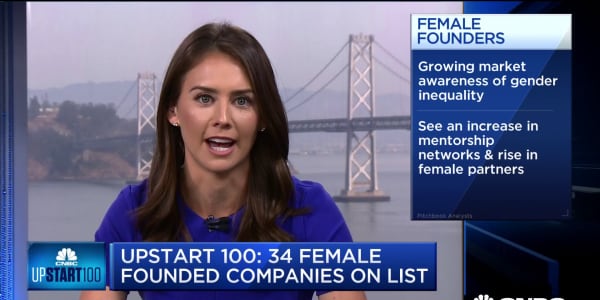A year ago CNBC launched the first Upstart 25 list with the premise that an increasing number of companies were racing out of the starting blocks to become impactful, revenue-generating ventures. And while many are a long way from becoming the next Uber or Airbnb, they are well worth keeping an eye on.
For 2018, CNBC has quadrupled the size of the list, with the goal of discovering a more diverse group of companies that reveal key trends and new market opportunities that smart entrepreneurs are chasing with the new companies they are founding. In retail we see new ventures targeting changing shopping habits, as advanced e-commerce and logistics technology allows for more customization; in health care, telemedicine is taking off, with upstarts using mobile apps to connect doctors and patients in a wide array of disciplines, from balding to birth control; and in transportation and warehousing we see companies using robotics and autonomous vehicle technology to continue to change the way humans and machines work together.
With 100 Upstarts instead of just 25, the list provides a broader picture of where venture capitalists are placing their bets on the future. As the IPO market heats up and the richest private start-ups begin to head for the exits, venture capitalists are making bigger bets on earlier-stage companies. According to PitchBook, early stage investing has risen for seven straight quarters, climbing to $11.5 billion in the second quarter of 2018, with an average deal size of $18 million.
The early injections of large amounts of capital means there are hundreds of young companies around the world with the potential to become acquisition targets, unicorn start-ups or public companies.
How we chose these 100 Upstarts
More than 500 start-ups responded to our call for submissions, supplying information about the company's founders, investors, growth, recent milestones and more, some of it off the record. To be eligible, companies had to be privately held and founded no earlier than Jan. 1, 2013. Companies also must have been pre-Series B in their funding and have raised no more than $50 million.
All eligible companies were then scored on eight equally-weighted quantitative metrics. The 100 highest-scoring eligible companies are our Upstarts. Here is a brief summary of each of the metrics that determined the Upstart 100.
Scalability
Achieving scale is not just about being able to produce and distribute enough product to meet demand; it's also about having a workforce capable of servicing existing customers and acquiring new ones. The scalability score is based on company-provided responses to a group of questions about the ability to meet customer demand and the growth and size of the company's workforce.
Sales growth
Based on company-provided sales numbers from 2016 and 2017, plus projected 2018 sales. Companies were asked to choose from a selection of ranges instead of providing exact numbers. Responses have been kept off the record because private companies are not required to make sales numbers public, and most would refuse to share sales numbers with CNBC if they thought we might publish them.
User/customer growth
Companies gave an estimate of year-over-year user or customer growth. The companies were not asked to specify whether or not these were paying customers or users. Responses have been kept off the record.
Workforce diversity
CNBC calculated a workforce diversity score based on company-provided answers to questions about certain demographic breakdowns of their employees and executives, including whether or not the company has a female founder and/or CEO.
Access to capital and community
This metric helped ensure an even geographic distribution for the Upstart 100.
Twenty-two of the nominees were the only companies nominated from a particular state (as happened in Arizona, Kansas and Maine, to name a few) or country (like Hungary, Indonesia and Norway). These companies received higher scores in this category than the 169 nominees from Silicon Valley or the 125 nominees from New York City.
Intellectual property
A measure of whether or not the nominee company owns a patent, which can be a critical source of competitive advantage for a new venture. We made no attempt to judge the quality of the patents owned, nor did we give extra weight to companies with more patents than others. This was a zero-sum category. Source: Google Patents.
Industry size and industry life-cycle stage
We researched each company's primary industry and, using IBISWorld's database of industry reports, determined the size of each industry (in U.S. dollars) and its life-cycle stage (growth, mature or decline). The score for these categories assumes that it's better to be a new venture in an industry that is large and growing than it is to be in one that is small and in decline.
Special thanks also to PitchBook, which we used to help confirm company eligibility. Fundraising was a determining factor for the list itself.






